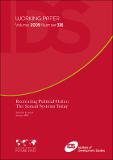Recreating political order : the Somali systems today
Abstract
The Somali pastoral system of production covers at least six political entities.
Three of the formal ones are within the borders of the former Republic of Somalia
and do not meet the full definition of states. Despite the warfare that has often
engulfed the former Somalia, it is a mistake to think of the three political entities
that occupy it as necessarily or wholly anarchic. Lineage institutions have survived
from the colonial era and been resurrected to provide venues for negotiation,
consensus-building and the reduction of interpersonal violence, even if not the
authoritative imposition of decisions upon groups of the unwilling. After 17 years of
centrality to the continuity of Somali governance and the recreation of quasi-state
political authorities, however, these lineage institutions are showing signs of
stress. As their great influence came to be recognised they were penetrated by
patronage and used by warlords to prosecute sub-clan warfare. They no longer
are able to provide consensus representation even in the peaceful political
systems of Somaliland and Puntland. Somalis therefore have experimented with
new political institutions that could provide a greater basis for cross-clan action
and authoritative decision-making – regional nationalism and democracy in
Somaliland and Islamic sheria in all the territories but especially by the nowdeposed
(but far from dead) Union of Islamic Courts. Indeed sheria now is a
central, unifying ideology throughout the Somalis, even if there is conflict over its
interpretation and the instrumentalities through which it will be enforced. Somali
governmental processes thus are present, but weak in their ability to impose
decisions and to project their authority into the rural areas. There are public goods
that Somalis need which only states can provide. But the transformation of
traditional order in the warlord conflicts of the last 17 years will make such states
difficult to create.
Keywords: Somalia; Somaliland; social contract; clan; sheria; statelessness.
Citation
Leonard, D.K. (2009) Recreating political order : the Somali systems today. Working paper series, 316. Brighton: IDS.Is part of series
IDS working papers;316Library catalogue entry
http://bldscat.ids.ac.uk/cgi-bin/koha/opac-detail.pl?biblionumber=182294Rights holder
Institute of Development StudiesCollections
- IDS Research [1671]

